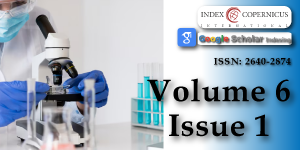Contamination of a water bottle warmer in neonatal Intensive care unit and Klebsiella Pneumoniae ESBL + outbreak: cases series
Main Article Content
Abstract
Infections caused by extended-spectrum β-lactamases (ESBLs)-producing bacteria in particular Klebsiella Pneumoniae (KPE+), are on a constant rise and are a noted cause of outbreaks in neonatal intensive care units (NICUs). In the NICU of Policlinico di Foggia, an outbreak of infections in 2018 brought to the start of a serial check of presence and favorable conditions associated with KPE+ diffusion. The outbreak was controlled by improving basic hygiene measures such as hand washing, the use of disposable gloves and gowns, and removing a potential environmental contamination source such as the water bottle warmer.
Article Details
Copyright (c) 2022 Maffei G, et al.

This work is licensed under a Creative Commons Attribution 4.0 International License.
Podschun R, Ullmann U. Klebsiella spp. as nosocomial pathogens: epidemiology, taxonomy, typing methods, and pathogenicity factors. Clin Microbiol Rev. 1998 Oct;11(4):589-603. doi: 10.1128/CMR.11.4.589. PMID: 9767057; PMCID: PMC88898.
Martin RM, Bachman MA. Colonization, Infection, and the Accessory Genome of Klebsiella pneumoniae. Front Cell Infect Microbiol. 2018 Jan 22;8:4. doi: 10.3389/fcimb.2018.00004. PMID: 29404282; PMCID: PMC5786545.
Tumbarello M, Spanu T, Sanguinetti M, Citton R, Montuori E, Leone F, Fadda G, Cauda R. Bloodstream infections caused by extended-spectrum-beta-lactamase-producing Klebsiella pneumoniae: risk factors, molecular epidemiology, and clinical outcome. Antimicrob Agents Chemother. 2006 Feb;50(2):498-504. doi: 10.1128/AAC.50.2.498-504.2006. PMID: 16436702; PMCID: PMC1366869.
Gras-Le Guen C, Lepelletier D, Debillon T, Gournay V, Espaze E, Roze JC. Contamination of a milk bank pasteuriser causing a Pseudomonas aeruginosa outbreak in a neonatal intensive care unit. Arch Dis Child Fetal Neonatal Ed. 2003 Sep;88(5):F434-5. doi: 10.1136/fn.88.5.f434. PMID: 12937053; PMCID: PMC1721613.
Rettedal S, Löhr IH, Natås O, Giske CG, Sundsfjord A, Øymar K. First outbreak of extended-spectrum β-lactamase-producing Klebsiella pneumoniae in a Norwegian neonatal intensive care unit; associated with contaminated breast milk and resolved by strict cohorting. APMIS. 2012 Aug;120(8):612-21. doi: 10.1111/j.1600-0463.2012.02879.x. Epub 2012 Mar 24. PMID: 22779683.
Donowitz LG, Marsik FJ, Fisher KA, Wenzel RP. Contaminated breast milk: A source of Klebsiella bacteremia in a newborn intensive care unit. Rev Infect Dis. 1981 Jul-Aug;3(4):716-20. doi: 10.1093/clinids/3.4.716. PMID: 7041217.
Huerta-García GC, Miranda-Novales G, Díaz-Ramos R, Vázquez-Rosales G, Solórzano-Santos F. Intestinal Colonization by Extended-Spectrum Beta-Lactamase-Producing Enterobacteriaceae in Infants. Rev Invest Clin. 2015 Sep-Oct;67(5):313-7. PMID: 26696335.
Reiss I, Borkhardt A, Füssle R, Sziegoleit A, Gortner L. Disinfectant contaminated with Klebsiella oxytoca as a source of sepsis in babies. Lancet. 2000 Jul 22;356(9226):310. doi: 10.1016/S0140-6736(00)02509-5. PMID: 11071189.
Cadot L, Bruguière H, Jumas-Bilak E, Didelot MN, Masnou A, de Barry G, Cambonie G, Parer S, Romano-Bertrand S. Extended spectrum beta-lactamase-producing Klebsiella pneumoniae outbreak reveals incubators as pathogen reservoir in neonatal care center. Eur J Pediatr. 2019 Apr;178(4):505-513. doi: 10.1007/s00431-019-03323-w. Epub 2019 Jan 23. PMID: 30671695.

